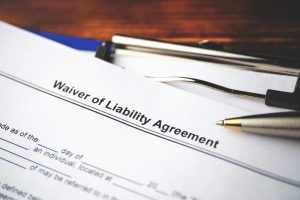I Signed A Waiver. Will That Prevent Me From Filing A Lawsuit?
 Liability waivers differ in language and terms, but most serve a similar purpose: protecting at least one party from legal claims resulting from accidental injury. If you sign a waiver, you are, in effect, relinquishing your right to file a lawsuit or initiate other legal action.
Liability waivers differ in language and terms, but most serve a similar purpose: protecting at least one party from legal claims resulting from accidental injury. If you sign a waiver, you are, in effect, relinquishing your right to file a lawsuit or initiate other legal action.
Making Sense of Liability Waivers
Most liability waivers contain the following components:
1. A section explaining the different types of risks that guests might encounter while visiting a location or engaging in certain activities at that location;
2. A section stating that the business is not responsible for any losses or injuries that you may sustain on-site; and
3. An acknowledgment that you, as a guest, are solely responsible for your physical well-being and personal belongings.
As a general rule, the only purpose of a liability waiver is to protect the business or property owner from being held responsible for the risks inherent to a location or activity. Some liability waivers stipulate that any legal claim must go through arbitration or mediation.
Places You Might Be Asked to Sign a Liability Waiver
You can be asked to sign a liability waiver almost any time you enter another person’s property.
However, in practice, only businesses that offer certain types of facilities and experiences routinely require customers to sign liability waivers. You may be asked to sign a liability waiver for:
1. A gym or fitness club;
2. A ski resort or private campground;
3. Adventure-sport activities, like waterskiing or skydiving;
4. School events requiring parental permission, like a field trip or other outing; and
5. Amusement parks.
You may also encounter liability waivers in unexpected places. Rideshare services like Uber and Lyft, for instance, will often try to bury liability waivers in their terms and conditions. These conditions may stipulate that the rideshare provider is not liable for any service-related loss or damage, including physical injuries.
The Effect of a Liability Waiver
If you’ve signed a liability waiver, you may be unable to file a personal injury lawsuit if you were injured, and the business or property owner was not unduly negligent. This is because, in New York State, liability waivers are often upheld in court if they meet the following conditions:
1. Clear, unambiguous language. A liability waiver is only valid if written in language that can be easily understood. Any terms and conditions must be clearly defined. If the waiver’s language is ambiguous to the point that a reasonable person would find it difficult to understand, then the contract may be unenforceable.
2. Voluntary assent. You must be allowed to read and understand the waiver for it to be enforceable. In other words, if you were pressured into signing a waiver—or were instructed to sign a form after being injured—it may not stand up under challenge.
Liability waivers can be found invalid for many other reasons, especially if a policy or practice could have wide-ranging public safety implications.
The Limitations of a Liability Waiver
The enforceability of a liability waiver is dependent on several different factors, such as:
1. The circumstances surrounding an accident;
2. State law, with New York prohibiting certain types of businesses from enforcing liability waivers; and
3. The business or property owner’s practices.
Under most circumstances, a liability waiver will not shield a business from claims related to negligence or unreasonably dangerous practices. Furthermore, some waivers may bar claims against the company but not against its owner or individual employees.
Contact an experienced personal injury lawyer in Buffalo, New York, to learn more.
 Buffalo Personal Injury Lawyer News
Buffalo Personal Injury Lawyer News

